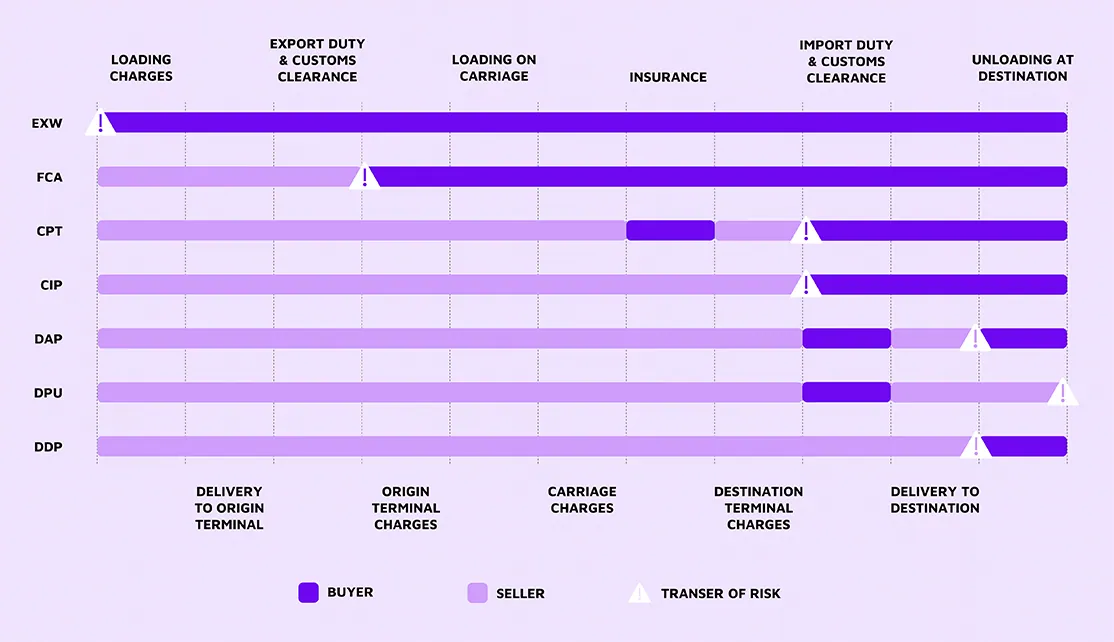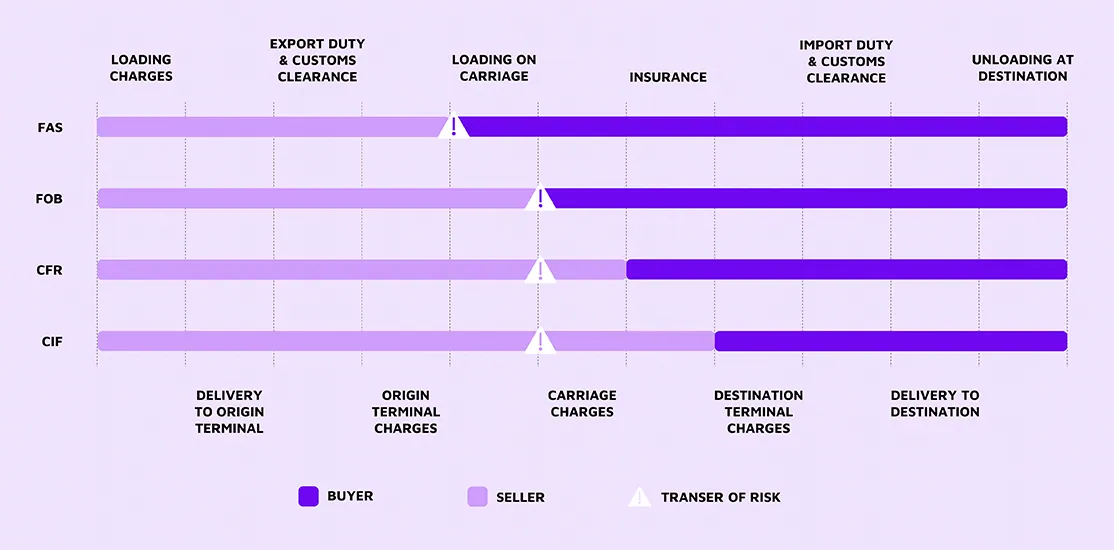Videos & Webinars
Watch videos featuring supply chain experts
Global trade is a massive and complex web of various importers and exporters across industries around the world. Given the fact that global trade encompasses all the countries in the world, it becomes important to standardize basic terminologies related to trading goods and commodities across nations. The International Chamber of Commerce(ICC) agreed upon a set of terminologies known as Incoterms to ensure that trade between various countries flows smoothly.
These incoterms are recognized globally by all buyers and sellers and are used by domestic and international trade parties to understand the business contracts between them and deal with a few challenges of exporting. They outline a set of basic rules that every buyer and seller must follow if they want to participate in international global trade. As of now, there are a total of 11 Incoterms.
Incoterms are not a generalized set of terms used to describe various aspects of global trade. Back in 1936, the International Chamber of Commerce (ICC) developed incoterms to simplify trading across the world. Since then, they have regularly updated Incoterms to meet global needs.
Incoterms are trademarked by the ICC and are used by importers, exporters, consultants, lawyers, shipping lines, trade financiers, and more involved in international trade. Incoterms were created to:
One thing to note is that by themselves, incoterms aren’t exactly legally binding. However, once they are set in a contract between the parties involved, the obligations must be met. The following are 7 reasons why incoterms are necessary.
Incoterms are essential in international trade and commerce for several reasons:
1. Clarity and Common Language: Incoterms provide a standardized set of terms and abbreviations, creating a common language for buyers and sellers across different countries. This clarity helps in avoiding misunderstandings and disputes regarding the responsibilities of each party involved in a transaction.
2. Risk Allocation: Incoterms clearly define the point at which risk and responsibility transfer from the seller to the buyer. This allocation of risk is crucial for determining who bears the cost and liability for potential damages or losses during transportation.
3. Cost Allocation: Incoterms outline the specific responsibilities for transportation, insurance, and other related costs. This clarity ensures that both parties have a clear understanding of their financial obligations throughout the shipping process.
4. Better Negotiations: By using Incoterms, negotiators can focus on the critical aspects of the transaction without having to clarify each detail of the shipment. This efficiency streamlines negotiations and reduces the risk of misunderstandings.
5. Global Consistency: Incoterms are recognized and accepted internationally. Their use provides a consistent framework for businesses engaged in global trade, regardless of their location or the jurisdictions involved.
6. Customs Compliance: Incoterms help in determining the point at which delivery is considered complete. This information is crucial for customs clearance, as it defines when the responsibility for import/export procedures transitions from the seller to the buyer.
7. Reduced Legal Risks: By clearly outlining the rights and responsibilities of each party, Incoterms help minimize legal risks and potential disputes. This is particularly important when dealing with different legal systems and jurisdictions.
Incoterms are periodically updated to reflect changes in international trade practices. This adaptability ensures that they remain relevant and applicable to the evolving landscape of global commerce. The last change related to incoterms was published in 2020. Before proceeding with each incoterm, it is important to specify the types of Incoterms.
Read More: The Ultimate Guide to Mexican Pedimentos
Incoterms are divided into two categories:
Incoterms for any mode of transport: These incoterms are common across all modes of transport such as road, rail, air, water, etc.
Incoterms for sea and inland waterway transport: These incoterms are specifically used for maritime trade transactions.
Out of the 11 incoterms specified by the ICC, 7 incoterms can be used by any mode of transport, these are:

The first two incoterms are on ‘Freight Collect Terms’, meaning the charges are paid to the freight company by the receiving party or the buyer. The other five are ‘Freight Prepaid Terms’ which outlines that the shipper or supplier is paying for the shipping charges.
EXW or Ex-works means that a seller is not responsible for transporting a buyer’s goods to their required destination. The only thing they must do is provide the goods for pickup when the buyer requires them. In simple terms, if a seller is on an EXW contract, the buyer will need to collect and transport the goods themselves.
In an EXW contract, all the risk is borne by the buyers themselves. Any damage to the goods will have liability for the buyer and not the seller. EXW contracts are common for domestic goods. It is recommended that buyers in an EXW contract make use of professional freight forwarders.
Free carrier means that a seller delivers the goods to another carrier or entity that the buyer decides. In an FCA, the seller is responsible for transporting the goods to a specified location that can either be a buyer warehouse, freight forwarder warehouse, a particular port or terminal, etc.
In such contracts, the seller is usually responsible for all the documentation until the specified location of delivery. In FCA contracts, the risk until the point of delivery is borne by the seller. Once a seller delivers the goods any other transportation or damage cost must be borne by the buyer.
‘Carriage paid to’ means that the seller needs to bear only the transportation costs for the goods till the point of delivery at the destination terminal.
In a CPT transaction, the seller does not need to cover insurance. Every buyer must ensure that insurance and risks are covered by them in a CPT contract.
CIP specifies that a seller is responsible for transporting goods to the point of delivery at the destination terminal while also bearing the transportation costs.
In simpler terms, the seller must bear all the costs required for transporting goods including insurance and damage costs. The insurance and risk costs for the goods until the point of delivery must be borne by the seller. After delivering the goods to a specified destination, the risk is passed on to the buyer.
Just like DPU, ‘Delivered at Place’ contracts require the seller to deliver the goods at the destination. One key difference lies in the fact that the seller is not responsible for unloading.
“Delivered to place unloaded” means that a seller will take care of all costs until they unload the product at the specified destination. Once they have delivered the goods, they do not bear any more risks.
Until then, the seller must take care of all formalities and costs. Under DPU, a seller is also responsible for unloading the goods at the destination. Import duties, taxes, and customs clearance are borne by the buyer.
‘Delivery duty paid’ means that the seller is responsible for the entire delivery process. Under a DDP contract, the seller bears all the risks of transporting and delivering the goods to exactly where the client wants.
DDP is the complete opposite of EXW. While in EXW, most responsibilities are borne by the buyer, in DDP all the responsibilities, including import taxes and customs clearance are borne by the seller.
Maritime transport has a few unique incoterms unique to itself. These incoterms only apply to maritime trade. There are 4 incoterms specific to maritime shipping:

Here, FAS and FOB are ‘Freight Collect Terms’ while CFR and CIF are ‘Freight Prepaid Terms’.
“Free alongside ship” is an incoterm used by sellers. This specifies that the goods the buyer wants are delivered ‘alongside’ the vessel at the required destination port. The risk for the goods is passed to the buyer once the seller drops off the goods where required.
In FAS contracts, a seller must ensure that the goods are delivered alongside the specified vessel on time. A buyer, on the other hand, should have a contract with the shipping line ready to ensure a smooth transfer of goods.
“Free on board” is an extension of FAS. In such a contract, the seller must deliver the goods onboard the shipping line specified by the buyer at the destination port. The risks and costs involved in such shipments are passed on to the buyer once the ship is loaded.
“Cost and Freight” specifies that a seller, often aided by a reliable freight forwarder, is responsible for loading the freight on board and is supposed to pay the freight cost until the specified destination. For CFR to work, the destination must be accessible by waterways.
Buyers must understand that while freight costs are borne by the seller, the ‘risk’ passes onto the buyer once the freight is loaded onto a vessel.
CIF is very similar to CFR contracts. The only difference lies in the fact that the seller needs to take care of a minimum insurance amount for the goods being transported. While the risk still lies with the buyer, minimum insurance must be provided by the seller.
Incoterms are essential tools that provide a standardized framework for international trade, offering clarity, risk and cost allocation, and a common understanding of responsibilities. Their use helps facilitate smoother transactions, reduce disputes, and contribute to the overall effectiveness of global supply chains. Thus, as global trade expands, Incoterms become more important each day. Companies negotiate better deals with buyers and suppliers by analyzing what incoterms they use most. Trademo Intel helps businesses find and decide the right incoterm for each buyer and supplier by providing this information from bill of lading documents.